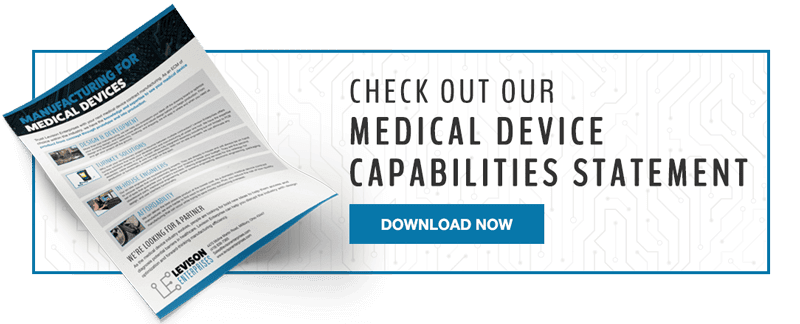Reducing Time to Market: Strategies for Efficient Medical Device Manufacturing
Bringing a medical device to market can take years. Medical devices are highly regulated, and require a level of scrutiny that is appropriate for their use. When manufacturing medical devices, the stakes are high. Not only is it important that the medical device perform as expected for effectiveness, the device must not cause any harm to those who use it. Developing an effective strategy for getting your device to market, which can minimize your overall timeline, is crucial for the success of any medical device launch.

Understanding the Challenges
The need for effective medical devices is growing, and the demand being placed on the industry is high. However, the innovation and development of medical devices can take a significant amount of time, money, and resources. Medical device projects require experienced and knowledgeable teams of designers, engineers, and manufacturing experts to work together. Medical devices often have complex designs that will require a specialized team. In addition, because of the healthcare industry requirements, there are also significant regulatory hurdles and compliance requirements. All medical devices must undergo thorough testing and many stages of product development, which can take time.
Other challenges that can delay time to market are supply chain constraints and sourcing delays. Supply chain constraints are a problem in nearly every manufacturing industry, and although there has been some improvement over the past few years, the challenges are expected to continue for several more. There are many shortages that can impact product development in medical devices. FDA regulations require high-quality parts from vetted suppliers that do not have the risk of counterfeit or substandard quality, and the shortages that can be a mere annoyance for other industries can have a serious impact on medical device manufacturing, as some of the workarounds are simply not possible.
Reduce Time to Market by Streamlining Regulatory Processes
The regulatory requirements themselves are important, necessary, and here to stay. However, time to market can be reduced when you are working with an electronic contract manufacturer who has a strong understanding of regulatory pathways and requirements. When you work with a high-quality ECM who is experienced in medical device manufacturing, they will understand the value in early engagement with regulatory authorities and will know how to prepare the comprehensive documentation of materials, suppliers, and testing for faster approvals. A good regulatory strategy will allow both the design team and the manufacturing team to properly assess the device at every stage during development and make adjustments, with the proper documentation and regulatory approval, as the device moves through the process.
Collaborative Design and Manufacturing Partnerships
When working to reduce time to market and get your device in the hands of the consumer as quickly as possible, working with a domestic, turnkey ECM has numerous benefits. The benefits of collaborating with experienced contract manufacturers are significant and can make the time to market far shorter than attempting to do the manufacturing in-house or outsourcing to an overseas manufacturer. An ECM who is experienced in working on medical device manufacturing will have vetted suppliers and vendors for streamlined logistics and ease of procurement. These high-quality ECMs understand the regulatory requirements and documentation processes, and will have suppliers they can rely on for all the necessary components of the device. During the manufacturing process, on-site engineers will be available for testing, prototyping, and making the necessary adjustments to keep the device on track. The engineering team can work with your product development team to address any issues with the device design and component placement. When potential issues are identified and addressed early in the process, the overall time to market is greatly reduced.
Risk Management and Contingency Planning
An experienced ECM knows the benefit of identifying potential risks and challenges in advance, creating contingency plans for unforeseen disruptions, and mitigating those risks to avoid delays in the manufacturing process. A strong focus on DFM (Design for Manufacturability) analysis and the value of prototyping and testing early in the process will help mitigate many of the risks associated with medical device manufacturing. DFM analysis can help mitigate the impact of component shortages while still remaining in compliance with all FDA regulations. If procuring components from vetted suppliers looks to be an issue, the engineering team can work with the design team to employ a contingency plan, which will likely involve redesigning parts of the device to incorporate components that are readily available. Rather than risk failure or extend the time to market, knowing the options from vetted suppliers will allow the manufacturing process to proceed on track.
Prototyping is another way to incorporate risk management. While all medical devices will go through heavy testing before being brought to market, developing a functional prototype early in the process can help identify any potential design or performance issues before a full scale run, and will allow the design and engineering team to collaborate on a redesign. In addition to looking at effectiveness and safety, a prototype can also address other design issues, such as size, temperature, and durability.
Medical devices should not be rushed to market before they are determined to be safe and effective, but this doesn’t mean that efficiency should be ignored. By working with a turnkey, domestic, and experienced ECM with experts in medical device manufacturing, the process can be streamlined and your device can be brought to market quickly while still meeting all regulatory requirements. Contact Levison Enterprises for a quote on your next medical device.
